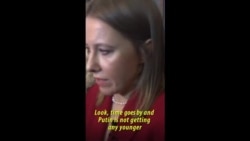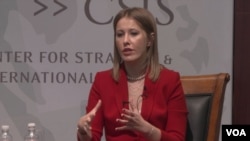Speaking on February 6 at the Center for Strategic and International Studies in Washington, DC, Russian presidential candidate Ksenia Sobchak said she represents the dissident Russian liberal minority that disapproves of President Vladimir Putin’s domestic and foreign policies.
The daughter of the late Anatoly Sobchak, who was the mayor of St. Petersburg and Putin’s former boss, Ksenia Sobchak said she has known Putin since her childhood, but disagrees with “what he is doing,” just as she disagrees with her mother, who is a pro-Putin member of the Federation Council, the upper chamber of Russia’s parliament.
Despite of her public criticism of Putin, Sobchak is the only self-proclaimed opposition figure in Russia who gets airtime on the government-owned TV channels, although often TV hosts demonstrate hostility towards her.
Others, like the anti-corruption activist and Kremlin critic Alexey Navalny, have been barred not only from the TV screens but also from running in the elections.
Sobchak says she knows she has no chance of winning the March 18 presidential election but believes that “street protests” are not what Russia, with her history of bloody revolutions, needs. She also says Russia must prepare for 2024 -- when she says, a transition of power will become possible.
Asked by Polygraph.info why she was allowed to register for the March presidential elections, Sobchak did not deny she had Putin’s permission to do so, but said the president is “not getting any younger” and that in what she described as “his last six years in power,” he is seeking a safe exit that will guarantee him immunity after retirement. According to Sobchak, Putin fears her less than he fears the other opposition leaders, and she can “find an understanding” with him on the way a transition will be implemented.
Asked whether she is saying that Putin is consciously engineering a democratic transition in Russia, Sobchak answered in the affirmative, and said she is the intermediary who can work with Putin to ensure a smooth and non-revolutionary transition from the current regime to democracy.
Many Russia watchers and experts do not share Sobchak’s belief that Putin is preparing for a democratic transition and reforms.
Speaking earlier this month in Washington, DC, Alexei Venediktov, chief editor of Ekho Moskvy (Echo of Moscow), Russia’s most popular radio station, said Putin “has no intention” of leaving power after 2024, but in fact plans on remaining in power “as long as he lives.”
In response to a question from Polygraph.info, Venediktov said that during the next six years “under Putin” Russia will “cross the point of no return, drowned in total isolationism and obstructionism.”
Boris Zilberman, a Russia analyst at the Foundation for Defense of Democracies, a Washington-based nonpartisan research institute focusing on national security and foreign policy, told Polygraph.info that Sobchak’s words do not reflect reality.
“Putin is indeed preparing Russia for an eventual transition. But the transition is to ensure stable continuation of the system he has built in the last 18 years,” Zilberman said.
“Saying that Putin is preparing Russia for a transition to democracy or a more democratic nation is a farce. There has been zero indication of any such moves or intentions,” he added.
In fact, there have been dramatic changes in Russia’s original post-Soviet constitution, all serving the purpose of solidifying the power of the president, including the extension of the presidential term from four to six years.
"Still, Sobchak is correct about one thing: Putin is not afraid of her. That is the entire point of why she is being allowed to do what she is doing. She is not a threat, unlike others who have been barred from running," Zilberman said.
Below is a full transcript of Ksenia Sobchak’s interview with Polygraph.info.
Q: Many say that Vladimir Putin never allows anything that he does not benefit from, that his continuation in power does not benefit from. Can you name a few reasons why he thinks allowing you to register [as a candidate] is beneficial for him?
Sobchak: “Look, time is passing, and Putin is not getting any younger. There are physiological factors that are beyond of even his power. I certainly believe in a transitional alternative. We all remember that in his own time he did not violate the constitution but found that formal means of transferring power to Medvedev. In fact, these reforms started by Medvedev were positive, it’s a pity they did not continue their existence. But I am absolutely sure that these are Putin’s last six years in power and he will be seeking some way out of the situation through a person who is comfortable for him, through a compromise figure, through the possibility of creating a situation in which he will not be persecuted after he gives up power. In this situation, I see as the most constructive thing to show that we have a liberal opposition that is ready to solve problems constructively, which is ready to struggle for the power, which is ready to listen to the other side as well; and which does not want change through revolution, and is ready for a constructive dialog about how this power transition will be implemented.
Q: Are you saying that Putin is consciously preparing for a transition of power?
Sobchak: I don’t know consciously or not, but I think these are his last six years, and that I can be precisely that intermediary, because I have known him for a very long time. I think he fears me much less than other opposition leaders and I think, that I, in fact, will have a chance to achieve my goals, and those of my colleagues from the opposition, to find some kind of understanding with the people in power that those goals must be achieved and, on the other hand, that he will be ready for such a dialogue. That is what I am betting on.







